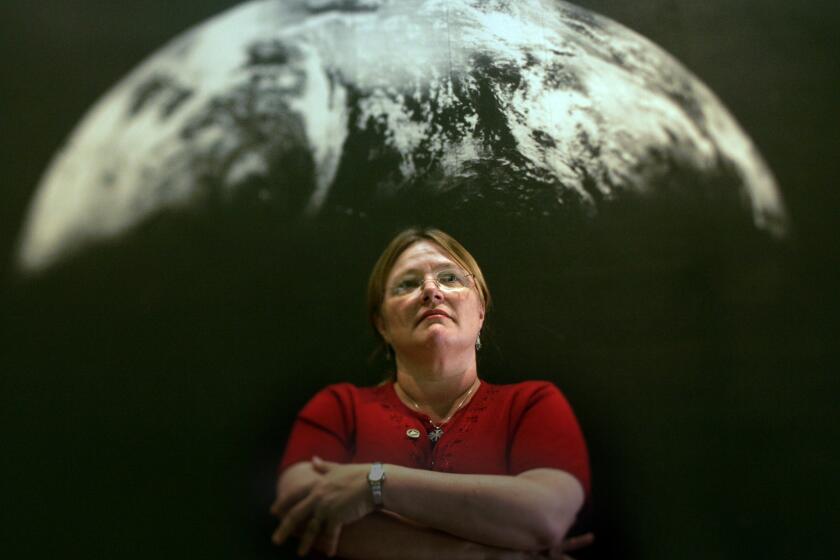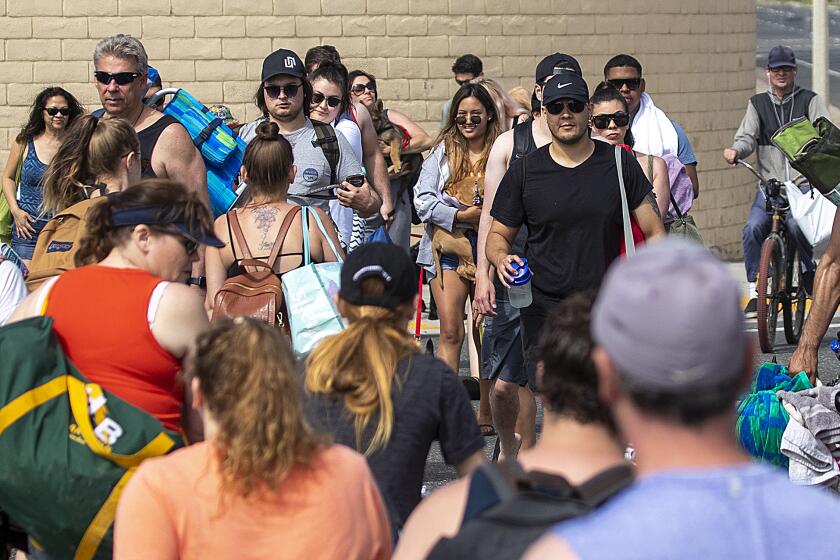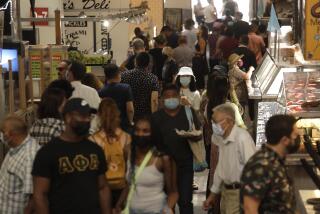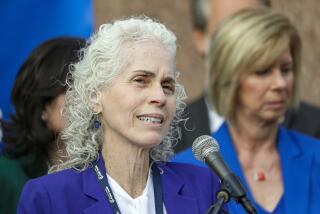On this Independence Day as coronavirus cases surge, please remember our interdependence
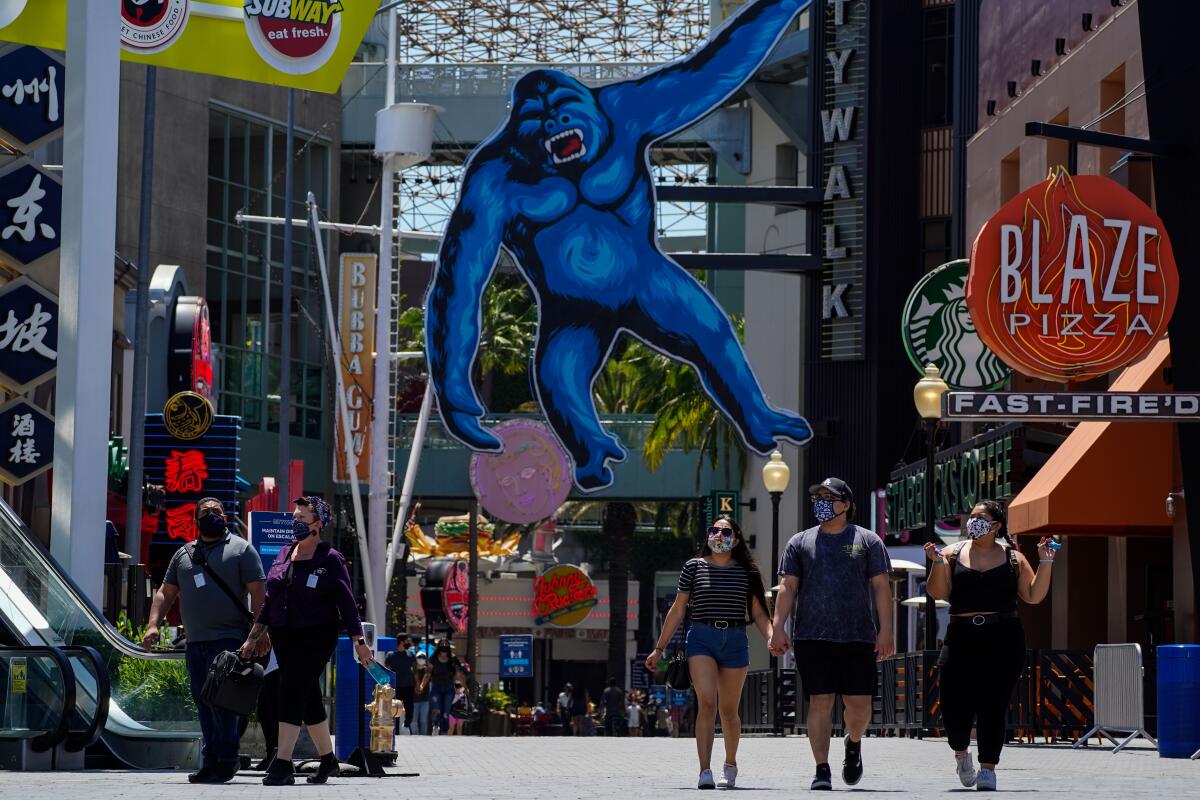
- Share via
I keep hearing people all over our country talk of their freedom and independence and rights when asked why they are not personally participating in our fight to slow the spread of the coronavirus.
They are independent and free to do what they like, they say. No one has the right to make them wear masks, maintain physical distance or avoid congregating en masse — to take the sensible steps that might help us all be free to go about our lives again.
On this Independence Day, I’d rather focus on our extreme interdependence, on how our future on so many fronts depends on our acting as one to help stem a global pandemic that has already killed more than 516,000 humans, more than 130,000 Americans, more than 6,100 Californians and more than 3,400 residents of Los Angeles County.
These numbers are real. They represent real people, real lives lost. Among them are many of our elders, our poorest and most vulnerable and people of color, who a growing number of us now are coming to understand we have been failing as a society to adequately protect for far, far longer than we’ve all been alive.
Lucy Jones has gotten us through many a crisis. The coronavirus pandemic may be different from an earthquake, but her analysis of it, in a new podcast, is as steady and clear as ever.
More than 26,000 Black people have died of coronavirus in our country — 23% of all deaths in which the race is known, which is close to double their 13% share of the population, according to a project tracking racial data.
It’s evidence of the systemic racism and resulting inequities in areas such as healthcare, housing and employment that drove people to the streets in protest, even in the face of the virus risk.
Some people who don’t want to take steps for our collective safety, by the way, see others’ participation in those protests as equivalent to their own decisions to go out in crowds at beaches, at pool parties and the like.
The risk of spreading the virus is great in both cases. We have yet to see a surge in infections from protests. But I think standing up for an end to police brutality and for justice and the rights of all is far different and more urgent than standing up for one’s right to life’s pleasures.
I also worry that the deep societal inequities many of us are now pushing to correct will all take far longer to chip away at if the coronavirus rages on and leaves more people unemployed, more people desperate, more people homeless, more government coffers depleted by loss of tax revenue and pandemic costs, fewer financial resources to support the sorts of efforts that try to create a safety net for those who most need one.
Last week, in hopes of convincing some stubborn holdouts among us to be more vigilant about protecting themselves and one another, I brought you the straightforward scientific reasoning of Lucy Jones, who has been studying the coronavirus closely. I told you her simple, clear safety message: Don’t share your air.
Jones spoke of the pandemic as a catastrophic disaster on a scale not previously known because it is happening everywhere. She also spoke of the challenge of trying to convince people to take steps to protect not just themselves but everyone else.
People have to have empathy to respond to such a message. Empathy has been on my mind a lot lately.
Trust is key as we reopen with the coronavirus still present
Our worlds are now global. So many of our borders are porous. In our own country, even now people are on the move from neighborhood to neighborhood, city to city, state to state. There’s no real way at the moment with our current resources to contain the virus in its hot spots if we don’t all accept our duty to act collectively to protect each other.
Our leaders thought we could start to open up our lives a little as long as we continued to act responsibly. But that clearly didn’t work.
Santa Monica and West Hollywood have vowed to enforce safe behavior by fining those out without masks. But that shouldn’t have to happen.
We’re in a tough spot now. We need everyone doing the right thing. L.A. just unveiled a color-coded system — red, orange, yellow, green — to tell us the current coronavirus threat level. Last I looked, we were at orange, which apparently means the threat of infection is very high, high enough to “assume you and everyone around you is infectious.”
I know there are a variety of reasons why people may not practice coronavirus safety precautions. Some, of course, take a defiant, rights-focused partisan stand. Some may not be able to sustain fear for too long. But I think many more may have grown so overwhelmed by the news that they stopped paying attention and blocked it out. A lot of young people no doubt simply are feeling invulnerable as young people do until something comes along that makes them realize that they’re not.
I have a neighbor I have to dodge because he likes to stand very close. He wears a mask only occasionally — and even when he does, it’s not fully on. He says he doesn’t believe in asymptomatic carriers. He feels fine so he’s fine. He doesn’t know anyone who’s had the virus.
When I see people out and about in busy places not bothering with the most basic coronavirus safety measures as our numbers of cases and hospitalizations spike, I find myself wondering how far their empathy extends. Across national borders? Across state and city lines? Across their own communities to those they don’t know?
Or are they unmoved by strangers, even those working in essential jobs who put themselves at daily risk for their benefit? Will their empathy and sense of shared purpose kick in only when suffering invades their own inner circles, when it climbs into the branches of their family trees, moves down their blocks, breaks into their homes?
And by then will it be of any use?
More to Read
Sign up for Essential California
The most important California stories and recommendations in your inbox every morning.
You may occasionally receive promotional content from the Los Angeles Times.
